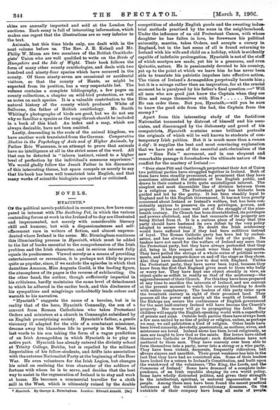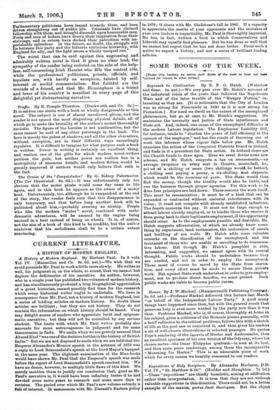NOVELS.
HYACINTH.*
OF the political novels published in recent years, few have com- pared in interest with The Seething Pot, in which the various contending forces at work in the Ireland of to-day are illustrated and impersonated, not merely with considerable literary skill and humour, but with a dispassionateness and self- effacement rare in writers of fiction, and almost unprece- dented where Ireland is the scene. Mr. Birmingham continues this illuminating process in Hyacinth, which must be added to the list of books essential to the comprehension of the Irish problem and the Irish character, and in serious interest fully equals its predecessor. Viewed merely as a means of providing entertainment or recreation, it is perhaps not likely to prove quite as popular, since, if we exclude the episodes in which that dauntless Amazon, Miss Augusta Goold, is the leading figure, the atmosphere of its pages is the reverse of exhilarating. On the other hand, the author, though sufficiently impartial in his criticisms, hardly maintains the same level of detachment to which be adhered in the earlier book, and this disclosure of his sympathies and misgivings undoubtedly lends colour and warmth to his narrative.
" Hyacinth " suggests the name of a heroine, but is in reality that of the hero, Hyacinth Conneally, the son of a convert from Roman Catholicism who takes Protestant Orders and ministers at a church in Connaught subsidised by an English proselytising society. Hyacinth's father, a gentle visionary ill adapted for the role of a combatant missioner, dreams away his blameless life in poverty in the West, his last words to his son taking the form of a vague prediction of an Irish Armageddon in which Hyacinth is to play an active part. Hyacinth has already entered the divinity school at Trinity College, Dublin, but is repelled by the militant Imperialism of his fellow-students, and drifts into association with the extreme Nationalist Party at the beginning of the Boer War. He even volunteers for the Irish Legion, but changes his mind on realising the true character of the soldiers of fortune with whom he is to serve, and decides that the best way to assist in the regeneration of Ireland is to stay and work at home. He becomes a commercial traveller for a cloth mill in the West, which is ultimately ruined by the double • Hvaciath. By George A. Birmingham. London: Edward Arnold. (138.]
competition of shoddy English goods and the sweating indus. trial methods practised by the nuns in the neighbourhood. Under the influence of an old Protestant Canon, with whose daughter he has fallen in love, he forswears his political animosity, marries, takes Orders, and accepts a curacy in England, but in the last scene of all is found returning to Ireland with his wife and child on a holiday, which is evidently capable of indefinite prolongation. Hyacinth is not of the stuff of which martyrs are made, yet his is a generous, and even Quixotic, nature. He is passionately devoted to his country, yet up to the point at which we leave him he has never been able to translate his patriotic impulses into effective action. The vision of Ireland's Armageddon perpetually haunts him ; but it is a mirage rather than an inspiration, for at the crucial moment he is paralysed by his father's final question :—" Will all men who are good just know the Captain when they see
Him and range themselves with Him ? Doubtless He can order them. But you, Hyacinth,—will you be sure to know the good side from the bad, the Captain from the enemy P" Apart from this interesting study of the fastidious Nationalist tormented by distrust of himself and his asso- ciates, and discouraged by the dishonesty and greed of his compatriots, Hyacinth contains some brilliant portraits the originals of which will be well known to students of con- temporary Irish politics. But it is much more than a roman a clef: it supplies the best and most convincing explanation that we have yet seen of the essential anti-clericalism of the new "Sinn Fein" movement, and in one eloquent and remarkable passage it foreshadows the ultimate nature of the conflict for the mastery of Ireland :- "Ever since Pitt and Castlereagh perpetrated their Act of Union two political parties have struggled together in Ireland. Both of them have been steadily prominent, so prominent that they have sometimes attracted the attention of the English public, and drawn to their contest a little quite unintelligent interest. The simplest and most discernible line of division between them is a religious one. The Protestant party has hitherto been guided and led by the gentry. It has been steadily loyal to England and to the English Government. It has not been greatly concerned about Ireland or Ireland's welfare, but has been con- sistently anxious to preserve its own privileges, powers, and property. It has not come well out of the struggle of the nine- teenth century. Its Church has been disestablished, its privileges and powers abolished, and the last remnants of its property are being filched from it. It is a curious piece of irony that this party should have hastened its own defeat by the very policy adopted to secure victory. No doubt the Irish aristocracy would have suffered less if they had been seditious instead of loyal. The Roman Catholic party has been led by ecclesi- astics, and has always included the bulk of the people. Its leaders have not cared for the welfare of Ireland any more than the Protestant party, but they have always pretended that they did, being in this respect much wiser than their -opponents. They have pulled the strings of a whole series of political move- ments, and made puppets dance on and off the stage as they chose. Also they have understood how to deal with England. Unlike the Protestant party, they have never been loyal, because they knew from the first that England gives most to those who bully or worry her. They have kept one object steadily in view, an object quite as selfish in reality as that of the aristocracy—the aggrandisement of their Church. For this they have been prepared at any time to sacrifice the interests of Ireland, and are content at the present moment to watch the country bleeding to death with entire complacency. The leaders of this party enter upon the twentieth century in sight of their promised land. They possess all the power and nearly all the wealth of Ireland. If the Bishops can secure the continuance of English government for the next half-century Ireland will have become the Church's property. Her money will go to propagating the faith. Her children will supply the English-speaking world with a superfluity of priests and nuns. Outside both parties there have always been a few men united by no ties of policy or religion, unless, as perhaps we may, we call patriotism a kind of religion. Other lands have been loved sincerely, devotedly, passionately, as mothers, wives, and mistresses are loved. Ireland alone has been loved religiously, as men are taught to love God or the saints. Her lovers have called themselves Catholic or Protestant : such distinctions have not mattered to these men. They have scarcely ever been able to form themselves into a party, never into a strong or a wise party. They have been violent, desperate, frequently ridiculous, but always sincere and unselfish. Their great weakness has lain in the fact that they have had no consistent aim. Some of their leaders have looked for a return to Ireland's Constitution, and built upon the watchword of the volunteers, The King, the Lords, and the Commons of Ireland.' Some have dreamed of a complete inde- pendence, of an Irish republic shaping its own world policy. Some have wholly distrusted politics, and given their strength to the intellectual, spiritual, or material regeneration of the people. Among these men have been found the sanest practical reformers and the wildest revolutionary dreamers. On the. outskirts of their company have hung all sorts of people. Parliamentary politicians have leaned towards them, and been driven straightway out of public life. Criminals have claimed fellowship with them, and brought discredit upon honourable men. Poets and men of letters have drawn their inspiration from their strivings, and in return have decked their patriotism with im- perishable splendour. In the future, no doubt, the struggle will lie between this party and the hitherto victorious hierarchy, with England for ally, and the fight seems a wholly unequal one."
The worst that can be said against this engrossing and admirably written novel is that it gives no clear lead, the sympathy of the reader being enlisted on the side of the help- less, self-tormenting Irish Hamlet who fills the central role, while the professional politicians, priests, officials, and loyalists are, with hardly an exception, tainted by self-
interest or sordid commercialism. But faithful are the 'wounds of a friend, and that Mr. Birmingham is a friend and lover of his country is manifest in every page of this
delightful yet disheartening narrative.















































 Previous page
Previous page